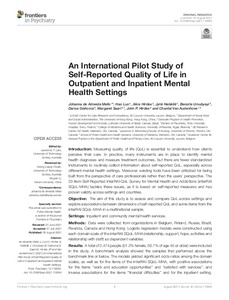An International Pilot Study of Self-Reported Quality of Life in Outpatient and Inpatient Mental Health Settings
Hirdes Alice; Heikkilä Jyrki; Hirdes John P.; Gishoma Darius; Van Audenhove Chantal; de Almeida Mello Johanna; Saari Margaret; Umubyeyi Benoite; Luo Hao
https://urn.fi/URN:NBN:fi-fe2021100750370
Tiivistelmä
troduction: Measuring quality of life (QoL) is essential to understand how clients perceive their care. In practice, many instruments are in place to identify mental health diagnoses and measure treatment outcomes, but there are fewer standardized instruments to routinely collect information about self-reported QoL, especially across different mental health settings. Moreover, existing tools have been criticized for being built from the perspective of care professionals rather than the users' perspective. The 23-item Self-Reported interRAI-QoL Survey for Mental Health and Addictions (interRAI SQoL-MHA) tackles these issues, as it is based on self-reported measures and has proven validity across settings and countries.Objective: The aim of this study is to assess and compare QoL across settings and explore associations between dimensions of self-reported QoL and some items from the interRAI SQoL-MHA in a multinational sample.Settings: Inpatient and community mental health services.Methods: Data were collected from organizations in Belgium, Finland, Russia, Brazil, Rwanda, Canada and Hong Kong. Logistic regression models were constructed using each domain scale of the interRAI SQoL-MHA (relationship, support, hope, activities and relationship with staff) as dependent variables.Results: A total of 2,474 people (51.2% female, 56.7% of age 45 or older) were included in the study. A benchmark analysis showed the samples that performed above the benchmark line or below. The models yielded significant odds ratios among the domain scales, as well as for the items of the interRAI SQoL-MHA, with positive associations for the items “work and education opportunities” and “satisfied with services”, and inverse associations for the items “financial difficulties” and for the inpatient setting.Conclusion: The analysis of associations between the determinants offers relevant information to improve mental health care and clients' perceived quality of life. Information about the determinants can help policymakers to design interventions to improve care outcomes, as well as provide more possibilities for integration into the community. The interRAI SQoL-MHA is innovative, as it can be linked to the third generation interRAI MH and Community MH-instruments, to be used in different mental health care settings, combining the objective and subjective QoL domains.
Kokoelmat
- Rinnakkaistallenteet [19204]
